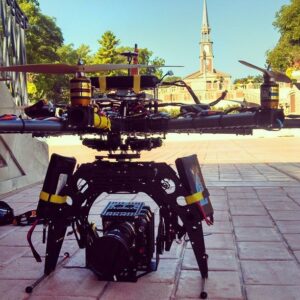By HEATHER HARTMANN
Capital News Service
LANSING – Imagine pulling on a harness, latching yourself to a wire and zip-lining through the treetops while a flying camera captures your wild ride on video.

The company’s Octocopter. Image: EAI
Fun fact: This actually happens.
Expertise in Aerial Imaging uses unmanned aerial vehicles – commonly known as drones – to capture video and photo images. The Grand Rapids business, known as EAI, has shot aerial perspectives of events as diverse as off-road street-car racing for Rally America and zip-liners careening through a forest of green for the Nantahala Outdoor Center in North Carolina.
Showcasing high-end homes for real estate agents is also in the mix.
The company’s clients “want the aerial perspective,” said Eric Snyder, EAI’s business manager and camera operator. “But they don’t want it from so high that people lose appreciation for what the outside of a building looks like, or something like that.
“We’re able to get those shots for them.”
The owner of Go! Media, Steve Secor, has hired Snyder several times to shoot video of events such as extreme winter sports and kayaking.
“For certain jobs, aerial gives you a better perspective,” he said.
Snyder and his business partner Tommy Knight founded the company in August 2012. The idea came from the X-Games, an event that focuses on extreme sports and is a leader in employing these aircraft in cinematography, said Snyder.
The use of drones in video offers a new perspective to films as well.
“As far as what you see on the screen, I think it would allow for more creative and interesting scenes,” said Steve Opsanic, executive director of the Great Lakes International Film Festival based in Pennsylvania.
Shots like this would otherwise not be possible, he said.
On top of the new angles drones provide, the other reason why Knight and Snyder began their business was that there was little to no competition in the industry when they started.
“As we looked around the West Michigan area, there really wasn’t anybody who was doing it in a full-on, full-out serious fashion,” said Snyder. “So we just kind of said, ‘Well, we think there’s a gap in the market here and let’s give it a shot.’”
Their timing was good.
A business entering into a new market is like riding a wave into shore, said Forrest Carter, Michigan State University faculty director and professor of marketing.
“Ideally, if it’s an emerging market, it’s growing, customers are being attracted to it, you don’t have a lot of the issues with a lot of competition, and you primarily only have to focus on expansion and satisfying the needs of the customer,” he said.
However, there are drawbacks with being a pioneer, said Carter.
“Entrepreneurship is the pursuit and the exploitation of opportunities,” he said.
“If clearly no one else is doing it, then you have the burden — particularly as it comes to raising funds or getting capital — you have the burden of proof that it is in fact an actual market, that people will pay for the product or service,” Carter said.
Using a small, eight-rotor helicopter that carries up to 15 pounds can be controversial.
Snyder said about 80 percent of the attention the drones get when used in public is good. The remaining 20 percent of the attention is negative and often comes from an older and more skeptical crowd who worry the drones are spying on them for the government.
Snyder said he and Knight explain what they are doing when people have questions, said Snyder. “Usually by the time the conversation is over, they are like, ‘Oh my gosh, that is a really cool idea.’”
It’s going to take a little while for people here in the States to become accustomed to it,” he said. “I think the more exposure they get to it in a positive light, hopefully that will kind of curb that angst about it.”
Ultimately though, using drones commercially comes down to the question of legality and where the Federal Aviation Administration stands. At the moment, the FAA says authorized users of drones are: public entities – as in government-funded researchers – the military and hobbyists.
The administration frowns upon commercial drone use, but right now this issue isn’t the government’s primary concern, said Snyder.
Since the company began, more drone-based businesses have appeared.
“All you’ve got to do is go online and type in a few keywords and they’ll find us all,” said Snyder. “And my feeling is if the government had the time, and they were really that worried about it, they could go online and find each and every one of us and send us all letters and say, ‘Stop doing what you’re doing.’ And that hasn’t happened yet.”
Wherever the company shoots footage, it contacts the local police to get the OK to fly, said Snyder.
“In this instance, I’d much rather try to ask permission than to plead forgiveness later,” he said.
“I think the only time you’re going to run into an issue doing what we’re doing is if you’re out being reckless,” said Snyder.
Go! Media’s Secor said he hires the company because of its concern for safety.
“It’s all about being transparent, I think, and letting people know what’s going on,” he said.
Overall, MSU’s Carter said, businesses in the emerging drone industry are taking profitable risks. “In general, I think this is an excellent example of people being ready and insightful to exploit opportunities that are arising because of a change in the market places or changes in technology.”
Snyder has high aspirations for the business’s future, as well as the future of commercial drones and says that he hopes using them becomes common.
“That would be my goal, my dream for it,” he said.
Heather Hartmann reports for Great Lakes Echo.